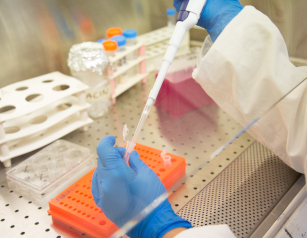HEAL ITALIA: Health Extended Alliance for Innovative Therapies, Advanced Lab-research, and Integrated Approaches of Precision Medicine
The project is the first national network of scientists, technologists and young researchers to share and develop knowledge, research and innovative technologies. It aims to strengthen the research and innovation chain in the field of precision medicine.

NRRP intervention area: Mission 4 – Education and Research
Component: 2 - From research to business
Investment: 1.3 - Extended partnerships with universities, research centres, businesses and research project funding
Duration: 36 months, ending on 30/11/2025
Total project funding: €114,700,000
Proposer: Università degli Studi di Palermo
Precision medicine for the health of everyone
Personalised and precision medicine refers to a new approach to treating and preventing disease in individuals that moves away from the generalist approach and takes into account the unique characteristics of each individual.
The Heal Italia partnership aims to identify new predictive and non-invasive diagnostic pathways to improve the prediction, detection and monitoring of monogenic and polygenic diseases and cancer.
Following the One Health approach of integrating different disciplines, Heal Italia will draw on the expertise of leading research groups and infrastructures from the academic, clinical and private sectors.
In particular, it will focus on the analysis of environmental factors, lifestyle and genetic determinants of multigenic and multifactorial diseases, in order to address the health needs of the most vulnerable layers of the population.
Project structure and participation
Foundation composition
Universities and research institutes
- Università degli Studi di Palermo
- Alma Mater Studiorum - Università di Bologna
- Università degli Studi di Roma "La Sapienza"
- Università degli Studi di Roma "Tor Vergata"
- Università degli Studi di Milano – Bicocca
- Università degli Studi di Modena e Reggio Emilia
- Università Politecnica delle Marche
- Università di Pisa
- Università degli Studi di Foggia
- Università degli Studi di Catania
- Università degli Studi di Cagliari
- Università degli Studi di Verona
- Istituto Superiore di Sanità - ISS
- Istituto Fisioterapici Ospitalieri – IRCCS
- IRCCS Centro Di Riferimento Oncologico Di Aviano
- IRCCS University Hospital of Bologna - Policlinico Sant’Orsola
Private actors
- Istituto Neurologico Mediterraneo Neuromed I.R.C.C.S.
- Fondazione Toscana Life Sciences TLS
- Upmc Italy Srl - UPMC
- Istituto Oncologico Del Mediterraneo Spa - IOM
- Bi-rex -Big Data Innovation & Research Excellence - BI-REX
- Engineering Ingegneria Informatica S.P.A
- Istituto Di Ricerche Farmacologiche “Mario Negri”
- Opella Healthcare Italy S.R.L.
- S.I.T. - Sordina IORT Technologies S.P.A.
Areas of action
- Spoke 1 - Holistic Nosology (leader: Università degli Studi di Roma "Tor Vergata")
- Spoke 2 - Intelligent health (leader: Alma Mater Studiorum - Università di Bologna)
- Spoke 3 - Prediction models (leader: Università degli Studi di Palermo)
- Spoke 4 - S4D Precision Diagnostic (leader: Università degli Studi di Roma "La Sapienza")
- Spoke 5 - Next-gen Therapeutics (leader: Università degli Studi di Milano - Bicocca)
- Spoke 6 - Health Toolbox (leader: Università degli Studi di Modena e Reggio Emilia)
- Spoke 7 - Prevention strategies (leader: Università Politecnica delle Marche)
- Spoke 8 – Clinical exploitation (leader: Università di Pisa)
The University of Bologna participates in all spokes and coordinates spoke 2.
Project team
University of Bologna participants
Scientific coordinator
Prof. Manuela Ferracin
National coordinator for Spoke 2
Prof. Stefano Diciotti
Teaching and research staff
- Maria Abbondanza Pantaleo
- Alessandro Bevilacqua
- Elisa Boschetti
- Lorenzo Breschi
- Giovanni Capranico
- Tobias Cramer
- Stefano Diciotti
- Igor Diemberger
- Gabriele Matteo D'Uva
- Manuela Ferracin
- Francesca Fornari
- Simone Furini
- Enrico Giampieri
- Mattia Lauriola
- Riccardo Masetti
- Francesco Massari
- Angela Montanari
- Filippo Piccinini
- Fabio Piscaglia
- Anna Maria Porcelli
- Matteo Rottoli
- Alessandra Ruggeri
- Castrense Savojardo
- Stefano Severi
- Silvia Turroni
- Maria Lucia Valentino
- Carlo Ventura
- Marco Viceconti
- Nelsi Zaccheroni
- Pier Luigi Zinzani
Staff hired with project funds
Researchers
- Chiara Bartolucci
- Giacomo Calini
- Giorgio Davico
- Andrea De Giglio
- Giulia Gallerani
- Carmen Miano
- Manuela Sollazzo
Staff with a research fellowship
- Matteo Cingolani
- Silvia Dallari
- Alessandro Di Federico
- Matteo Manfredi
- Luca Muratori
- Sara Peluso
- Nag Pratik
- Alessandro Rapone
- Linnea Valeri
PhD students
- Alessio Aloisio
- Emma Coschina
- Andrea Espis
- Giorgia Procaccianti
- Clara Vianello
Departments involved
- Department of Chemistry "Giacomo Ciamician" - CHIM
- Department of Electrical, Electronic and Information Engineering "Guglielmo Marconi" - DEI
- Department of Biomedical and Neuromotor Sciences - DIBINEM
- Department of Physics and Astronomy "Augusto Righi" - DIFA
- Department of Medical and Surgical Sciences - DIMEC
- Department of Industrial Engineering - DIN
- Department of Computer Science and Engineering - DISI
- Department of Pharmacy and Biotechnology - FaBiT
- Department for Life Quality Studies – QUVI
- Department of Statistical Sciences "Paolo Fortunati" – STAT
The work carried out so far by the university research teams on this project includes:
- analysis to understand disease at the molecular and cellular level, using technologies that can lead to a faster diagnosis and more targeted treatments. Specific studies on how cancer cells spread and behave to find new ways to fight cancer;
- the creation of digital platforms that, using artificial intelligence, can analyse medical data on a large scale, promoting personalised medicine and improving diagnosis and treatment strategies;
- studies on predictive models of how genetic variations affect health. In particular, biological indicators have been identified in the blood that can reveal the presence of disease, allowing simpler and less invasive diagnoses.
What activities are in progress?
In the coming months, studies of genetic variations and how they can affect health conditions and the effectiveness of treatments will be further investigated. A particular focus will be on the use of Artificial Intelligence to better predict disease and to tailor treatments.

